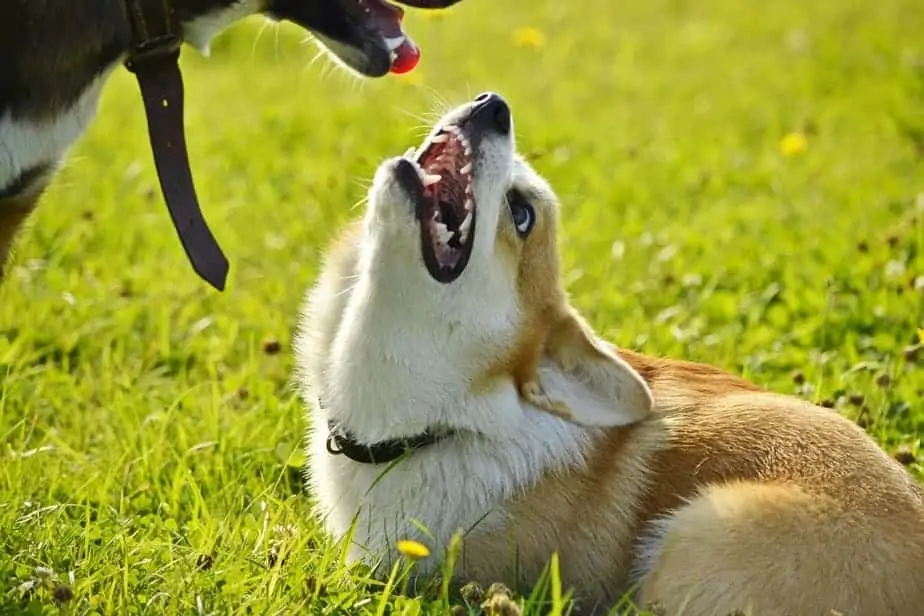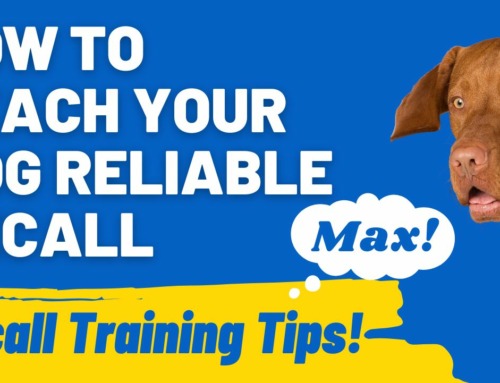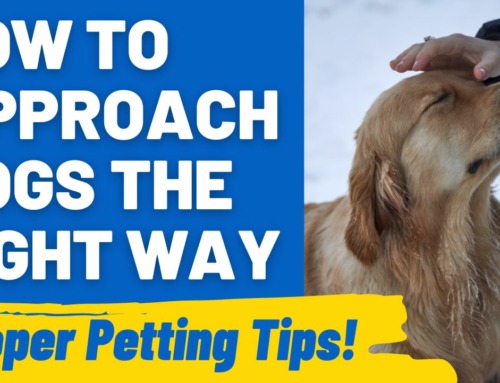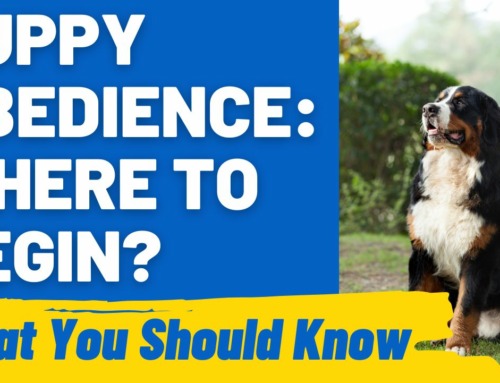We all hope that raising a puppy will go smoothly, but there are often many bumps along the way. In some cases, you may find that your puppy starts to display aggressive behavior. It can be scary and uncomfortable, especially as you try to navigate a solution.
In this article, we will look at why your Corgi puppy may be displaying aggression, as well as ways to stop aggressive behavior in your Corgi, and when to seek professional help.
Why is my Corgi puppy acting aggressively?
Firstly you should determine whether your Corgi’s aggression is based in fear, or if it’s a behavioral response.
Fear response aggression will be an obvious attempt by your Corgi to say “Get away from me!”
Watch for these signs of true aggression:
- Rigid body language
- Wide eyes
- Ears back
- Growling
- Lowered body
- Biting and snapping
True aggression, in the majority of cases, comes from a place of fear. Growling, barking, snapping, and biting serves to try and add distance between themselves and whatever is scaring your corgi puppy.
If you think that your Corgi puppy is having more a behavioral issue with their biting and growling, then these two posts can definitively help:
Puppy Growls When Picked Up: (How to Resolve)
Calm Down Your Crazy Puppy: A Complete Guide
It’s easy to get in a habit of thinking of aggressive behavior as a dog behaving poorly, and offensively acting out. Instead, it’s important to understand that aggressive behavior is often a way to tell the scary thing to go away.
However, genetics also absolutely play a role in behavior. You cannot always overcome all aggression with behavior modification and training.
Choosing a corgi puppy from a responsible breeder, without a history of aggression, is a great way to set yourself up for success.
If you are seeing aggression in your corgi puppy, especially growling or biting, you will likely need professional help. Aggression at that level in a young puppy is rare in a mentally healthy dog.
How can I stop aggression in my corgi?
Understanding the Ladder of Aggression is necessary when dealing with aggression in a dog.
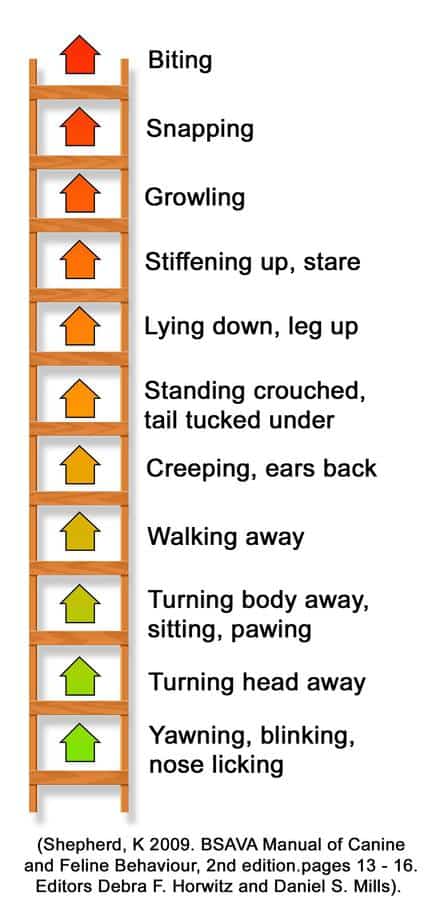
There will be behavior displays that occur before the growling and biting that we often associate with aggression, such as yawning, turning away, and stiffening body language.
It’s also important to understand that aggression is likely coming from a place of fear. The signs of aggression, such as barking and growling, are a symptom of that fear.
If you’d like a comprehensive guide to fear-based or anxiety-based aggression, be sure to read our post on this subject here.
In order to create long-term behavior change, you will need to change the underlying reason for your dog’s aggression. Stopping the barking or growling will not change how your dog feels about a situation.
In fact, punishing or disciplining your corgi puppy for growling can make the situation increasingly unsafe for you. Growling is often the last thing that happens before a dog bites.
Dogs that are punished for growling will likely stop growling, because they’ve learned that growling doesn’t work. Instead, they skip straight to biting.
Dogs that no longer growl often become extremely unsafe to work with, and likely need management for the rest of their lives.
Because of this, it’s extremely important to remember that growling is simply communication, and should never be punished. In fact, some trainers will even say that a growl is a gift!
Instead, a dog that is growling should be listened to in order to avoid a bite. In the moment, the best thing to do is remove your Corgi puppy from the situation that is making them growl or act aggressively.
If you are the one causing your Corgi puppy to growl, you should remove yourself from the situation instead.
Aggression cannot be solved in the moment. Keeping your Corgi puppy and everyone else around them safe is your highest priority.
Once the situation has been defused, you should take a moment to write down everything that led to that situation. If you were able to notice anything in particular that caused your puppy to react aggressively, that is especially important.
Trainers and behavior consultants refer to these as “triggers” and knowing what causes your puppy to react aggressively is critical.
Not only can you avoid the situation, but you can also break the trigger down into something less scary, and then use counter-conditioning and desensitization to change how your corgi puppy feels about the trigger.
Managing an aggressive Corgi puppy
It’s critical that you avoid putting your corgi puppy in a situation that may cause them to respond aggressively. This might mean changing your routine with your corgi puppy.
Barriers such as a baby gate or extra doorway can be incredibly useful for keeping everyone safe when dealing with an aggressive corgi.
Muzzle training is also an important skill for all dogs to learn, but especially those that display aggression. Teaching your corgi puppy to be comfortable wearing a muzzle will give you an extra layer of safety.
A great resource for how to teach your dog to be comfortable in a muzzle is the Muzzle Up! Project. A properly fitted muzzle will allow your corgi puppy to pant, drink, and take treats without being able to bite.
Not only does management help keep everyone safe, but your corgi puppy will also avoid practicing the aggressive behavior. The more times your corgi puppy is put in a situation where they feel the need to react aggressively, the harder it will be to change their behavior in the future.
Working with a professional is the best way to solve true aggression in your corgi puppy. Because of the variety of aggression that can be found in dogs, as well as safety concerns, handling aggression yourself is not recommended.
Instead, looking for a Certified Dog Behavior Consultant through the Certification Council for Professional Dog Trainers or the International Association of Animal Behavior Consultants is almost always a necessary step for the long term.
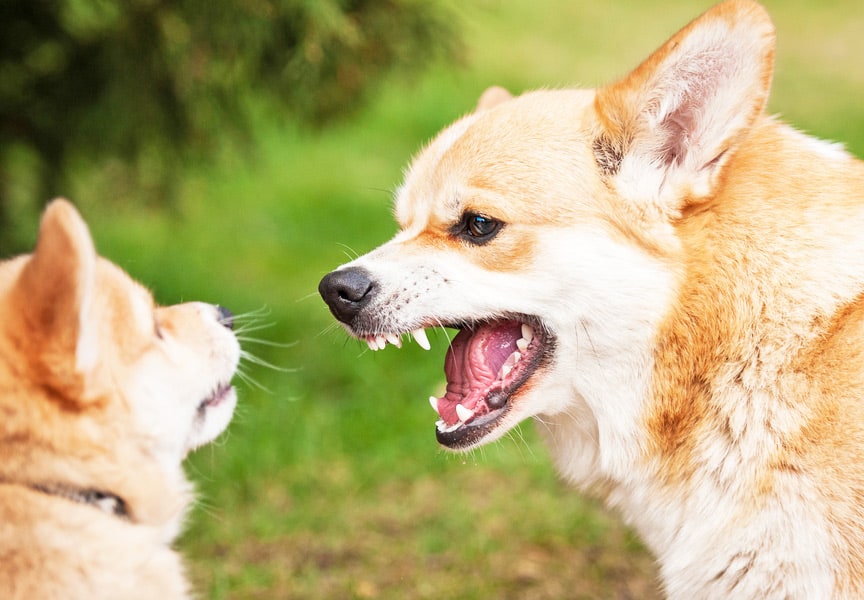
Does growling always mean my corgi puppy is aggressive?
No, growling itself does not necessarily mean your corgi puppy is aggressive.
First off, growling is a method of communication, and all dogs may growl at some point during their lives. A dog that occasionally growls is not necessarily an aggressive dog.
In addition, growling doesn’t always come from a place of fear or aggression. Sometimes, dogs growl when they play!
As corgis are a talkative breed, you may hear a variety of growls and grumbles during play sessions with your puppy.
The best way to tell if these growls are playful or not is to look at the full picture of your corgi puppy’s body language. A dog that is growling due to aggression or fear is likely to be very stiff in their body language, while a playful dog should be loose and floppy.
One great resource for learning more about dog body language is the iSpeakDog website. There, you will find photos and videos, along with helpful explanations of a variety of scenarios, that will help you become more comfortable reading a dog’s body language.
My corgi puppy is only aggressive on the leash
Leash aggression is a common phenomenon in dogs as well.
It’s thought that dogs may display aggression when on leash more than off leash because the leash “traps” them and prevents the flight option when dogs choose between fight or flight in response to something scary.
In addition, the leash can also be incredibly frustrating because it prevents dogs from going to see what they want. Without proper training, that frustration and high arousal can easily switch into aggression.
It’s often hard to tell if your corgi puppy’s barking and growling on a leash is actually aggression, or if they are simply frustrated and over-aroused. Because of this, it’s not recommended that dogs meet on leashes in general.
Not only is there a risk for increased aggression, but it also can help you take more relaxing walks with your corgi puppy.
If your puppy learns that they only get to play with other dogs off leash, and that leashed walks are for sniffing and exploring on their own, you’ll run into fewer problems of your puppy being distracted on walks in the future.
Final Thoughts
Looking at your Corgi’s body language is a great first step in determining if their growling is coming from a place of fear and aggression, or if it’s actually playful.
Aggression is a serious concern that often requires professional help to solve, and not all cases of aggression can be resolved.
However, you can set yourself up for success by not disciplining your corgi puppy for growling, and using good management (such as a baby gate or muzzle) to keep everyone safe and avoid practicing the aggressive behavior.
Please be sure to read our comprehensive guide to puppy aggression.

